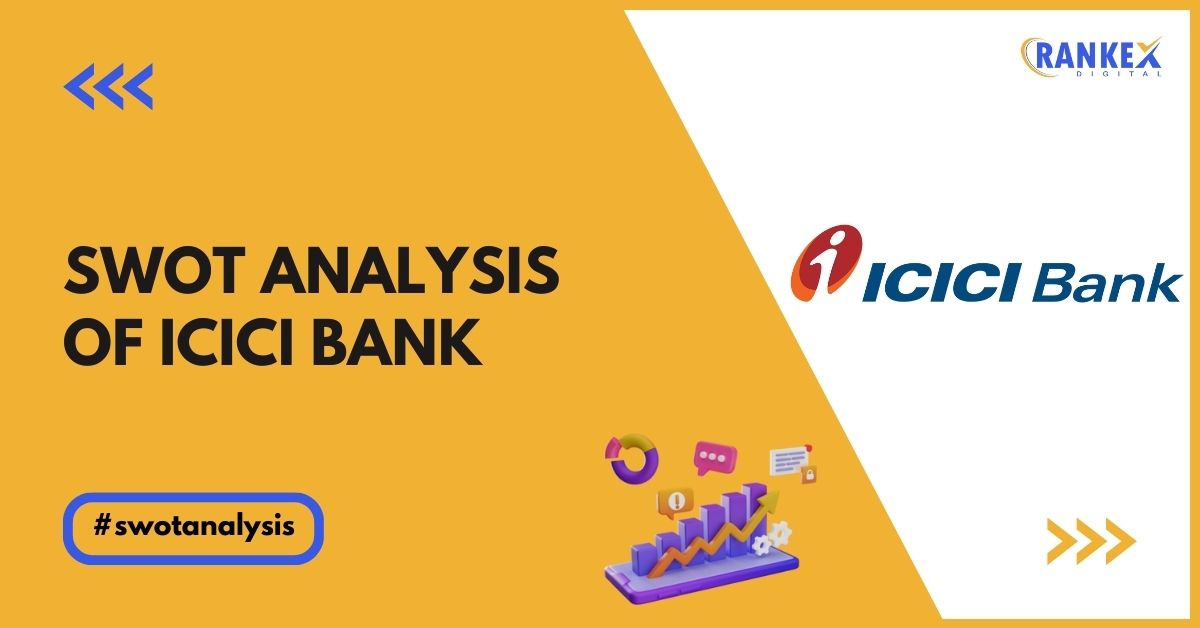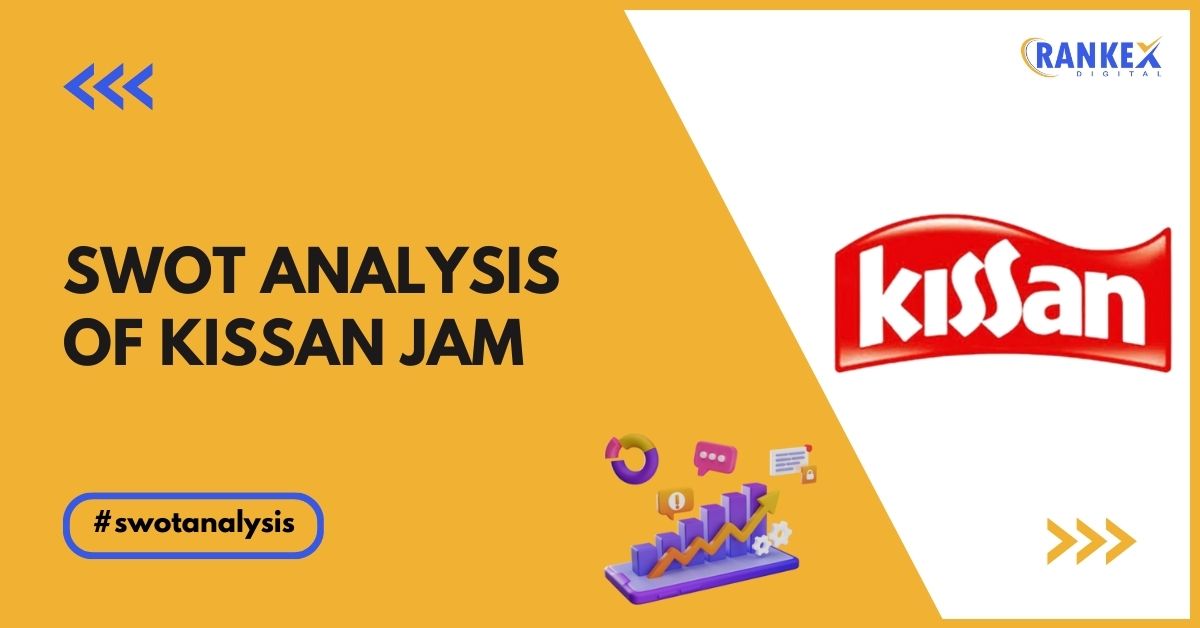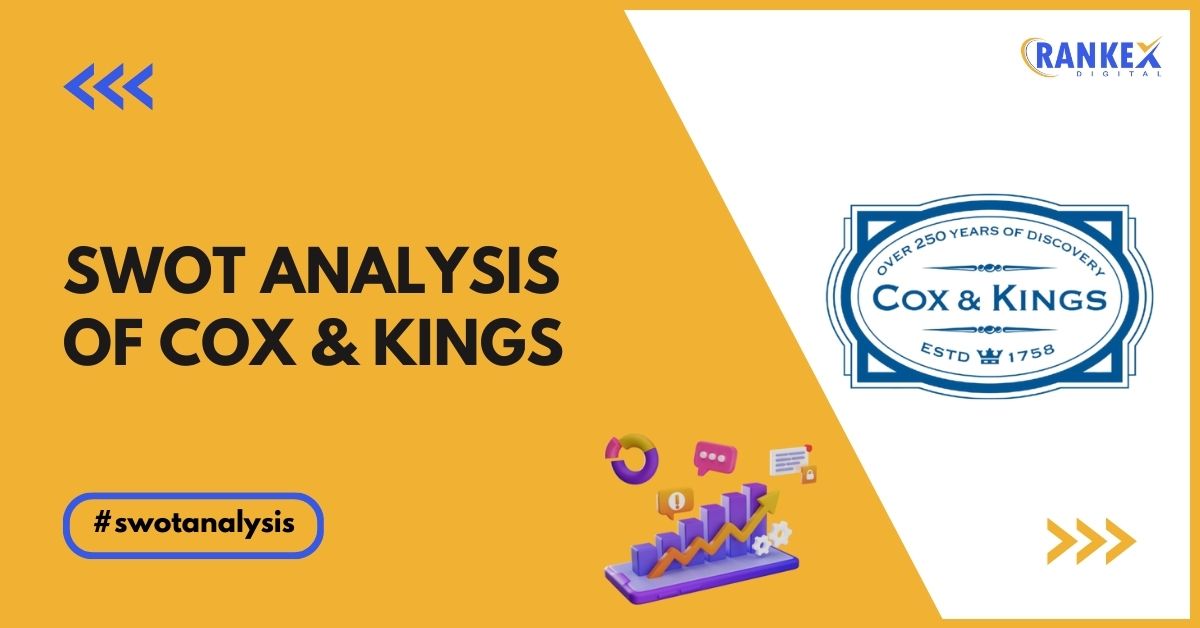ICICI Bank is one of India’s largest private sector banks, renowned for its comprehensive range of financial products and services. Let’s make a SWOT analysis of ICICI Bank for a strategic movement. Since its inception in 1994, ICICI Bank has grown to become a significant player in the banking industry, known for its innovation, customer-centric approach, and robust financial performance.
Conducting a SWOT (Strengths, Weaknesses, Opportunities, and Threats) analysis is essential for understanding ICICI Bank’s current market position and future potential.
This article delves into ICICI Bank’s strengths, weaknesses, opportunities, and threats, providing a comprehensive view of the bank’s strategic landscape.
Table of Contents
Overview of ICICI Bank
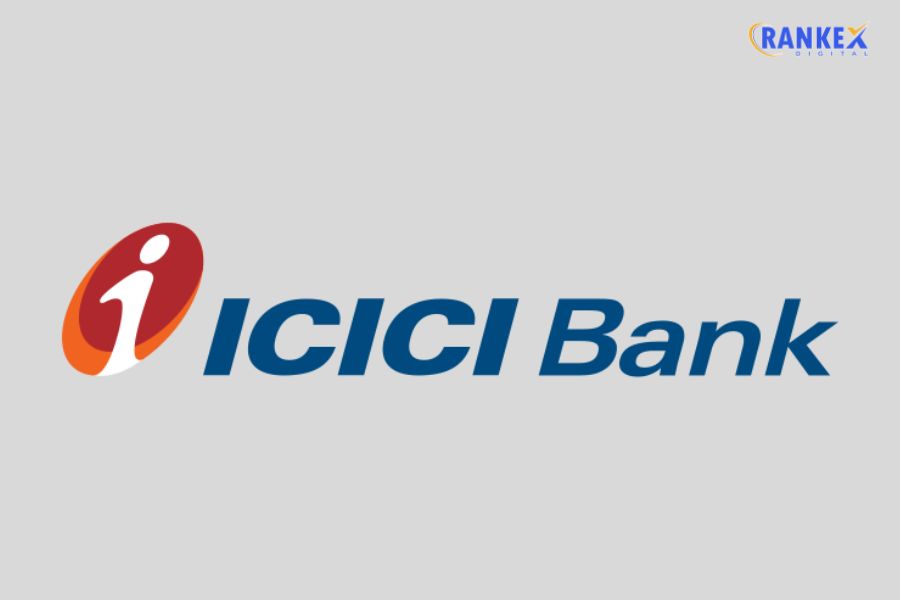
ICICI Bank, headquartered in Mumbai, Maharashtra, India, offers a wide array of financial products and services, including retail banking, corporate banking, and wealth management.
With an extensive network of over 5,200 branches and 15,000 ATMs across India, ICICI Bank serves millions of customers.
Known for its strong digital banking platform and innovative financial solutions, ICICI Bank continues to lead in the competitive banking sector.
Quick Stats About ICICI Bank
| Founder | Industrial Credit and Investment Corporation of India (ICICI) |
| Year Founded | 1994 |
| Origin | Vadodara, Gujarat, India |
| No. of Employees | 100,000+ |
| CEO | Sandeep Bakhshi |
| Company Type | Public |
| Market Cap | $80 Billion |
| Annual Revenue | $20 Billion |
| Net Profit | $3.5 Billion |
SWOT Analysis of ICICI Bank
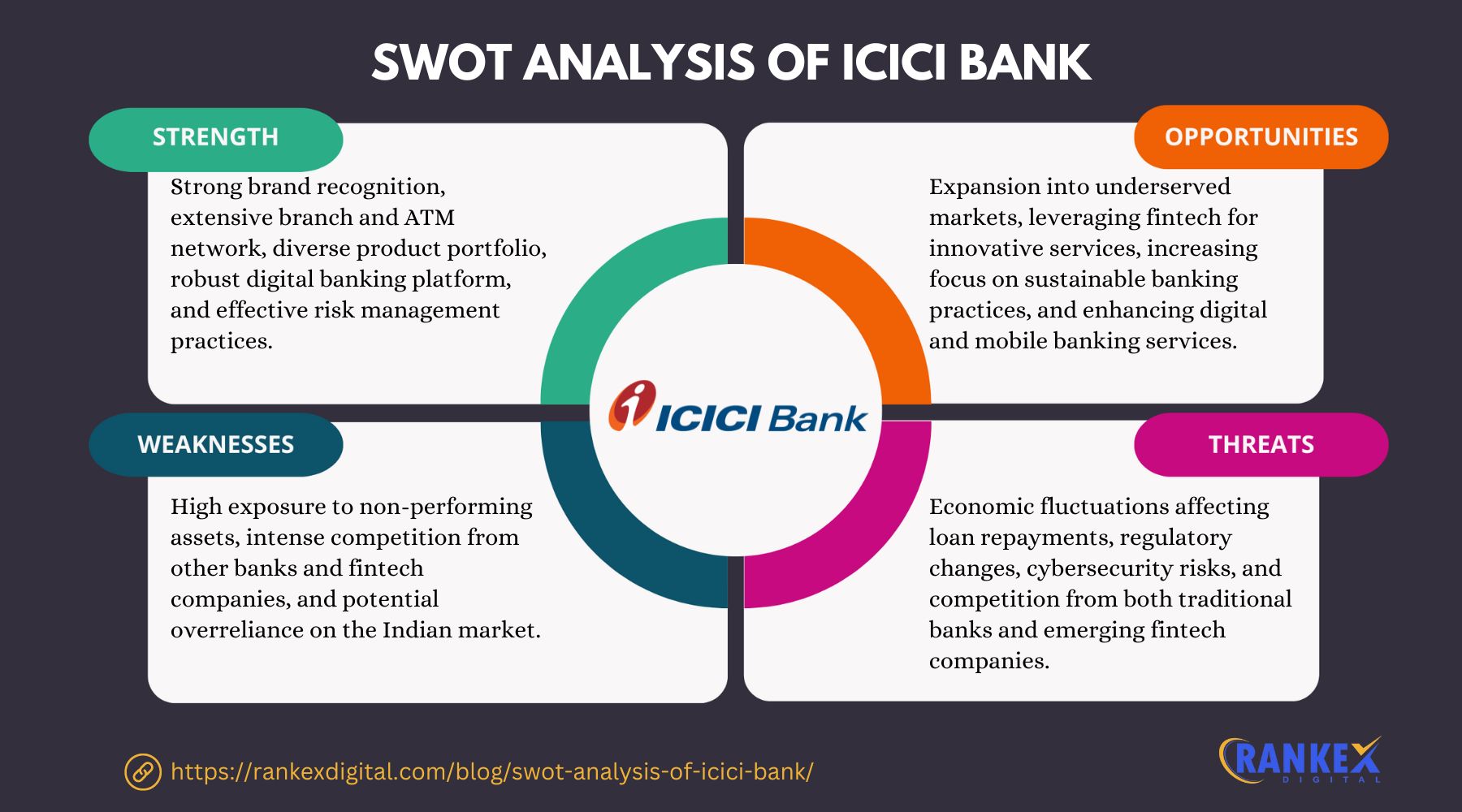
Strengths of ICICI Bank
ICICI Bank possesses several strengths that have contributed to its success and reputation in the banking industry:
- Strong Brand Recognition: ICICI Bank is a well-known and trusted brand in India, recognized for its reliability and comprehensive financial services.
- Extensive Network: With over 5,200 branches and 15,000 ATMs, ICICI Bank ensures accessibility and convenience for its customers nationwide.
- Innovative Digital Banking: The bank is a pioneer in digital banking, offering a robust online banking platform, mobile banking apps, and various digital financial services.
- Diverse Product Portfolio: ICICI Bank provides a wide range of financial products and services, catering to retail, corporate, and institutional customers.
- Strong Financial Performance: ICICI Bank has consistently demonstrated strong financial performance, with healthy revenue growth, profitability, and a solid capital base.
- Customer-Centric Approach: The bank focuses on providing excellent customer service, personalized banking solutions, and a seamless banking experience.
- Experienced Management Team: ICICI Bank’s leadership team comprises experienced professionals with extensive knowledge and expertise in the banking and financial sector.
Weaknesses of ICICI Bank
Despite its strengths, ICICI Bank faces certain weaknesses that can hinder its growth and performance:
- High Operational Costs: Managing a large branch network and maintaining high-quality services involve significant operational costs, impacting overall profitability.
- Exposure to Non-Performing Assets (NPAs): Like many banks, ICICI Bank faces challenges related to non-performing assets, affecting its asset quality and financial stability.
- Intense Competition: The bank operates in a highly competitive market, with numerous private and public sector banks vying for market share, which can impact its customer base and profitability.
- Dependence on Indian Market: The bank’s heavy reliance on the Indian market exposes it to economic fluctuations and regulatory changes within the country.
- Risk Management Challenges: Managing credit risk, market risk, and operational risk remains a challenge for ICICI Bank, requiring continuous improvement in risk management practices.
Opportunities for ICICI Bank
ICICI Bank can explore several opportunities to enhance its growth and market position:
- Expansion into International Markets: ICICI Bank can explore opportunities to expand its presence in international markets, tapping into new customer bases and diversifying its revenue streams.
- Growth in Digital Banking: With the increasing adoption of digital banking, ICICI Bank can enhance its digital offerings, invest in advanced technologies, and attract tech-savvy customers.
- Diversification of Product Portfolio: Introducing new financial products and services, such as insurance, investment products, and fintech solutions, can help ICICI Bank diversify its offerings and revenue sources.
- Focus on Financial Inclusion: ICICI Bank can leverage government initiatives and programs to enhance financial inclusion, reaching underserved and unbanked populations in rural and semi-urban areas.
- Sustainable Banking Practices: Emphasizing sustainable and green banking practices can enhance ICICI Bank’s reputation, attract environmentally conscious customers, and align with global sustainability trends.
- Strategic Partnerships: Forming strategic alliances with fintech companies, technology firms, and other financial institutions can enhance ICICI Bank’s service offerings, innovation capabilities, and market reach.
Threats to ICICI Bank
ICICI Bank faces several threats that can impact its business and market position:
- Intense Competition: The banking sector in India is highly competitive, with numerous private and public sector banks vying for market share, posing a threat to ICICI Bank’s customer base and profitability.
- Regulatory Changes: Changes in banking regulations, monetary policies, and compliance requirements can impact ICICI Bank’s operations, profitability, and strategic initiatives.
- Economic Fluctuations: Economic downturns, fluctuations, and market volatility can affect the bank’s performance, particularly in terms of loan defaults, credit risk, and investment returns.
- Cybersecurity Threats: As a digital-first bank, ICICI Bank faces the risk of cyberattacks, data breaches, and technological disruptions, which can harm its reputation, customer trust, and financial stability.
- Changing Customer Preferences: Evolving customer preferences and expectations for digital banking, personalized services, and innovative financial solutions can pose challenges for ICICI Bank to stay relevant and competitive.
- Global Economic Uncertainty: Global economic uncertainties, geopolitical tensions, and trade disruptions can impact ICICI Bank’s international operations, investments, and overall business environment.
Conclusion
The SWOT analysis of ICICI Bank highlights its strong brand recognition, extensive network, innovative digital banking, diverse product portfolio, strong financial performance, customer-centric approach, and experienced management team as key strengths.
However, high operational costs, exposure to non-performing assets, intense competition, dependence on the Indian market, and risk management challenges are notable weaknesses.
Opportunities for ICICI Bank lie in expanding into international markets, enhancing digital banking services, diversifying its product portfolio, focusing on financial inclusion, emphasizing sustainable banking practices, and forming strategic partnerships.
Threats include intense competition, regulatory changes, economic fluctuations, cybersecurity threats, changing customer preferences, and global economic uncertainty.
By leveraging its strengths and opportunities and addressing its weaknesses and threats, ICICI Bank can continue to grow and maintain its leadership position in the banking sector.
Frequently Asked Questions
1. What is ICICI Bank?
ICICI Bank is one of India’s largest private sector banks, offering a wide range of financial products and services, including retail banking, corporate banking, and wealth management.
2. When was ICICI Bank founded?
ICICI Bank was founded in 1994.
3. What services does ICICI Bank offer?
ICICI Bank offers a variety of services, including savings and current accounts, loans, credit cards, investment products, and digital banking services.
4. How does ICICI Bank maintain its competitive edge?
ICICI Bank maintains its competitive edge through strong brand recognition, an extensive network, innovative digital banking solutions, a diverse product portfolio, and a customer-centric approach.
5. What are the main challenges faced by ICICI Bank?
The main challenges faced by ICICI Bank include high operational costs, exposure to non-performing assets, intense competition, dependence on the Indian market, and risk management challenges.
6. How can ICICI Bank improve its profitability?
ICICI Bank can improve its profitability by optimizing operational efficiency, enhancing digital banking services, diversifying its product portfolio, and focusing on financial inclusion and sustainable banking practices.
7. What opportunities can ICICI Bank explore for growth?
ICICI Bank can explore opportunities in expanding to international markets, enhancing digital banking services, diversifying its offerings, focusing on financial inclusion, and forming strategic partnerships.
8. What threats could impact ICICI Bank’s business?
Threats to ICICI Bank’s business include intense competition, regulatory changes, economic fluctuations, cybersecurity threats, changing customer preferences, and global economic uncertainties.
9. How important is technological advancement for ICICI Bank?
Technological advancements are crucial for ICICI Bank as they can enhance digital banking services, improve operational efficiency, and meet evolving customer expectations.

